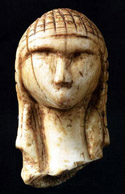Anthropology, Department of

Department of Anthropology: Faculty Publications
Document Type
Article
Date of this Version
Summer 2005
Abstract
The Ju/'hoansi (!Kung) of Namibia and Botswana are unusual for the strong norm to name children exclusively for kin and primarily for grandparents. Naming carries important significance by linking the two namesakes and because names are a basis for extending fictive kin links. In the 1950s Lorna Marshall reported that the father has the right to name children and that he "invariably" named them for the paternal grandparents, although having the option of naming children born later for his wife's parents. The authors used a large database of genealogical information that was collected nearly concurrently with Marshall's report to test the strength of the naming rule and found that approximately 70 per cent of men name the first-born son or daughter for their own parent of the child's gender. The degree of compliance is of interest because it falls short of 100 per cent. However, analysis of the naming patterns reveals a strong patrilateral bias in naming for the paternal rather than the maternal grandparents. This type of gender and unilateral bias is not normally reported for Ju/'hoansi, who are otherwise described as gender egalitarian and bilateral in most customary practices.


Comments
Published in ETHNOLOGY vol. 44 no. 3, Summer 2005, pp. 243-259. Copyright 2006 The University of Pittsburgh.